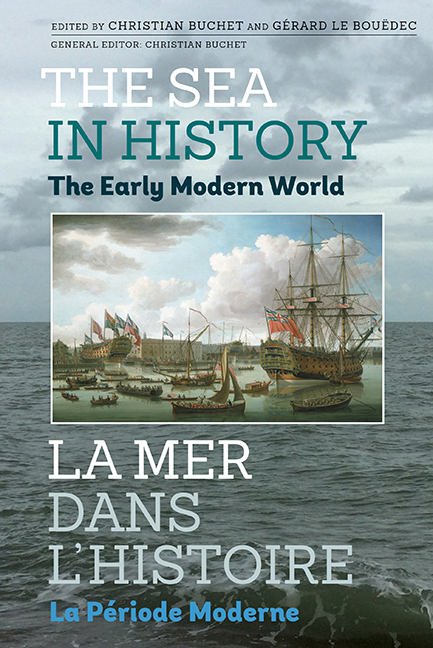Book contents
- Frontmatter
- Contents
- List of Illustrations
- List of Contributors
- Introduction générale et remerciements par
- General introduction and acknowledgements
- Introduction (français)
- Introduction (English)
- LA RÉUSSITE PAR LA MER:La reussite par la mer des territoires et des communautés littorales
- La construction d'un espace mondial: La circulation maritime et les ports
- La forte croissance de l'économie des pêches et des échanges
- Les acteurs de la dynamique maritime
- LA PUISSANCE MARITIME INSTRUMENT DE LA PUISSANCE POLITIQUE ET D'UNE STRATÉGIE GLOBALE DE RAYONNEMENT VOIRE DE DOMINATION: Les puissances maritimes occidentales
- L'océan Indien, entre convoitises et indifférences
- Les puissances maritimes asiatiques
- L'Afrique
- La politique maritime et l'idéologie
- Mer et développement technologique
- Développement maritime et maîtrise économique et financière
- Développement maritime et maîtrise organisationnelle
- Conclusion (français)
- Conclusion (English)
- Conclusion générale par
- General conclusion by
- Miscellaneous Endmatter
- Miscellaneous Endmatter
General introduction and acknowledgements
Published online by Cambridge University Press: 11 May 2017
- Frontmatter
- Contents
- List of Illustrations
- List of Contributors
- Introduction générale et remerciements par
- General introduction and acknowledgements
- Introduction (français)
- Introduction (English)
- LA RÉUSSITE PAR LA MER:La reussite par la mer des territoires et des communautés littorales
- La construction d'un espace mondial: La circulation maritime et les ports
- La forte croissance de l'économie des pêches et des échanges
- Les acteurs de la dynamique maritime
- LA PUISSANCE MARITIME INSTRUMENT DE LA PUISSANCE POLITIQUE ET D'UNE STRATÉGIE GLOBALE DE RAYONNEMENT VOIRE DE DOMINATION: Les puissances maritimes occidentales
- L'océan Indien, entre convoitises et indifférences
- Les puissances maritimes asiatiques
- L'Afrique
- La politique maritime et l'idéologie
- Mer et développement technologique
- Développement maritime et maîtrise économique et financière
- Développement maritime et maîtrise organisationnelle
- Conclusion (français)
- Conclusion (English)
- Conclusion générale par
- General conclusion by
- Miscellaneous Endmatter
- Miscellaneous Endmatter
Summary
‘History is not a fishing expedition, historians do not cast their net at random to see what (if any) fish they may catch. We will never find answers to questions that have not been asked’, wrote Antoine Prost in his remarkable book Douze Leçons sur l'Histoire. This is the very spirit, the sum and substance of Océanides.
This international research programme, unprecedented in the breadth of its approach since the publication of the first Encyclopædia, does not aim to write a maritime history of the world; indeed, diverse teams have already done so within various academic initiatives. Rather, building on the proliferation of research into maritime history, particularly over the past 15 years, the goal is to answer the following question: is the sea the differentiating factor in the overall development of populations? What developments can be attributed to the sea, both in general history and in the history of specific entities, particularly political entities? How did the sea modify the course of history for the populations in question? In what ways do maritime activities make it possible to consolidate strength and development by enabling actors to take full advantage of demographic potential and scientific knowledge, as well as geographic, political and financial situations? Is the sea a factor in success, development and/or influence? For the purposes of this study, the ‘sea’ is more than the water and the beach. It also encompasses all activities linked with maritime pursuits, be they on the shore, on riverbanks or even far inland.
This research programme is organized around simple questions that apply everywhere and throughout history:
• Is the sea the differentiating factor in world history, part and parcel of the most distinguished accomplishments?
• What additional advantages did the sea provide to the groups that engaged in maritime activities (regardless of the nature of the populations in question: social groups, tribes, peoples, cultural entities, regions, cities, states, etc.) compared to other groups that remained firmly on dry land? How did the sea influence development and leadership, however these phenomena may be manifested in relation to economy, culture, forms of political organization, technical progress, etc., and how have these contributions continued to the present day?
• What resources (natural, human, financial, etc.) did these groups have at their disposal before taking to the sea? What were their needs?
- Type
- Chapter
- Information
- The Sea in History - The Early Modern World , pp. xxiii - xxviPublisher: Boydell & BrewerPrint publication year: 2017

